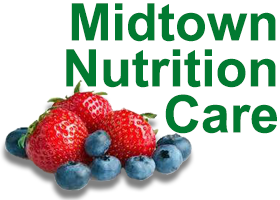ARE YOU MEETING YOUR NUTRITIONAL NEEDS?
–Try to fill half your plate with non-starchy vegetables (green leafy vegetables, broccoli, carrots, mushrooms).
–Limit starches to about 1 cup for grains and starchy vegetables (corn, potatoes, peas, plantains, butternut squash).
–Try to make half of your grains whole grains (whole wheat pasta, wild rice, brown rice, quinoa, barley).
–Limit meats to 3-4 ounces (oz) at a meal (about the size of a deck of cards or the palm of your hand).
–Lean proteins are best (chicken, fish, eggs, turkey).
–Plant-based proteins are also excellent choices (lentils, beans, black-eyed peas, edamame, tofu, tempeh).
–Choose healthy fats (monounsaturated and polyunsaturated fats) and eat them in moderation (1-2 tsp olive oil or one-quarter to one-half an avocado).
–Limit saturated fat (butter, cream, cream cheese, full fat cheeses), and trans fat (foods made with hydrogenated oils such as crackers, cookies, chips).
–Limit added sugar:
—-Women: try to limit to 6 tsp of added sugar/day or 24 grams/day.
—-Men: try to limit to 9 tsp of added sugar/day or 36 grams/day.
—-A good rule of thumb is to buy foods that have less the 6 grams or less of sugar per serving.
–Fruit is a good option for a snack or dessert.
–In general, it is recommended to have 2 fruit servings/day:
1 serving =
–Half a large banana
–Half a mango
–Half a large pear
–1 orange
–1 cup of berries, grapes, or melon
–1 small apple
–2 TBSP dried fruit
EAT NUTRIENT DENSE FOODS
–Avocado (One-fourth of an avocado = 1 tsp of oil)
–Greens (chard, collard greens, kale, mustard greens, spinach)
–Bell peppers
–Brussel sprouts
–Mushrooms
–Potatoes and sweet potatoes
–Cantaloupe, orange, raspberries, strawberries
–Low-fat yogurt
–Eggs
–Seeds (flax, pumpkin, sesame, and sunflower) 1-2 TBSP
–Beans (garbanzo, kidney, navy, pinto)
–Lentils, peas
–12 almonds or cashews or 20 peanuts = 100 calories–Barley, oats, quinoa, brown rice–Salmon, halibut, cod, scallops, shrimp, tuna–Lean beef, lamb–Chicken, turkey
SOURCES OF FOLATE
–It is important to have a good store of folic acid if you are to become pregnant because it reduces the risk of neural tube defects.
–Non-pregnant women need 400 micrograms (mcg) of folic acid/day.
–Lentils, half cup cooked (180 mcg folate)
–Spinach, half cup cooked (132 mcg folate)
–Black beans, half cup cooked (128 mcg folate)
–Sunflower seeds 1.5 oz (101 mcg folate)
–Turnip, half cup cooked (85 mcg folate)
–Broccoli, half cup cooked (84 mcg folate)
–Peanuts 1.5 oz (62 mcg folate)
–Consider a folate supplement if you may become pregnant.
SOURCES OF VITAMIN D
–Children and adults up to 70 need 600 international units (IU) vitamin D/day (over 70 needs 800).
–Not found naturally in many foods.
–Best sources are sunlight or supplements.
–3 oz tuna fish (154 IU vitamin D)
–8 oz milk fortified with vitamin D (115-124 IU vitamin D)
–Yogurt fortified with vitamin D (80 IU vitamin D)
–Egg (41 IU vitamin D)
–Consider taking Vitamin D3 supplement or multivitamin with 800-1000 IU/day.
